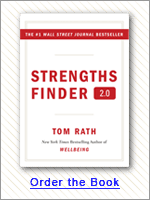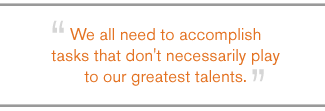As someone who has worked with thousands of employees and managers on strengths development, I have been asked just about every conceivable question regarding this topic. It occurred to me that it might be helpful to address some of the questions I'm most often asked about discovering talents and building strengths.
 |
This is the first of several articles that will do just that. In fact, this series will debunk several commonly accepted myths about strengths. Myth #1, which I'll cover here, suggests that adopting a strengths-based approach means you can ignore your weaknesses.
The reality is that you can't. To understand what this means, though, it is important to first define "weakness." In a strengths-based approach, a "weakness" is a shortage or misapplication of talent, skill, or knowledge that causes problems for you or others.
Using this definition, it's obvious that we can't ignore our weaknesses. Ignoring weaknesses doesn't banish them; it just makes them worse -- and they'll continue to stand in the way of what we want to accomplish. We have to deal with them so they'll quit dogging us.
Open communication
In far too many workplaces, admitting that something is dragging you down is a sure-fire way to derail your reputation and future opportunities. In a strengths-based approach, dealing with your weaknesses is not good for just you; it also helps your teammates and the company as a whole.
A strengths-based approach encourages open communication and positive action in the face of difficult situations in several ways. First, at the individual level, people begin to honor the fact that they are unique and that they need to find their own distinctive ways to succeed. For instance, Suzanne, who is fun and outgoing, establishes relationships with customers easily and closes deals right and left. But that doesn't mean that her more reserved colleague, Bill, isn't just as successful at making sales. Bill, who is more contemplative and deliberate, just goes after business in a different way -- and sells just as much. A strengths-based approach can help Suzanne and Bill appreciate and capitalize on their unique talents.
Second, a strengths-based approach helps people at all levels understand that operating from weakness is a bad thing for each person and is, therefore, ultimately a bad thing for the company. The strengths concept encourages companies to create performance management processes, development programs, and career paths that enable employees and the systems that support them to function in unison and maximize the best in people every day.
How to manage your potential weaknesses
We all have days when everything goes right at work. We tackle the day's tasks with gusto, and completing everything on our to-do list seems to happen effortlessly.
Many times, though, that list includes tasks we dislike -- and maybe some that we dread. Mark, for example, who dislikes numbers and loathes doing his expense reports, arrives at work to find an ominous email message from Accounting notifying him that he won't get reimbursed at all if his forms aren't completed in the next 48 hours. Jennifer, who avoids writing whenever possible, receives a call from her manager, who says he's looking forward to reading her latest project report -- tomorrow.
 |
Like Mark and Jennifer, we all need to accomplish tasks that don't necessarily play to our greatest talents. How we conquer these challenges depends on our ability to manage the lack or misapplication of talent, skill, or knowledge that is causing the problem. Here are some strategies that can help you confront your potential weaknesses and overcome them:
- Get the right education and training. How often have you seen an obviously talented person struggle at a job, only to discover that he or she simply didn't have the proper knowledge or skill for the role? The solution to this problem is often straightforward: a bit of education and training. A morning-long computer-instruction class for a "computer illiterate" yet talented salesperson or manager could lead to significantly improved performance.
- Leverage your greatest talents. If someone has been fully educated and trained for the job but is still struggling, sometimes it is because he is using the wrong talents -- or the right talents in the wrong way -- to tackle an aspect of the job.You can't easily change the ways in which you least naturally think, feel, or behave as a unique individual, but you can make the most of your naturally powerful talents. I mentioned earlier that Suzanne uses her outgoing nature to build relationships with customers and win sales. That approach just doesn't come to Bill very naturally, so trying to be an extrovert simply won't work for him. But Bill is inherently adept at gathering data and creating a compelling business case. This, then, is his best approach for closing more business.
- Form complementary partnerships. This solution is somewhat similar to leveraging your greatest talents, but in this case, you borrow the talents from someone else. What if Suzanne could generate a great deal of interest in a sale but her customer needed a compelling business case to be convinced to buy? Wouldn't a partnership between Suzanne and Bill make sense? Suzanne could break the ice, then use Bill as her subject matter expert to close the deal. And the same concept applies to knowledge and skills. If you don't have it, partner with someone who does.
- Just do it. Sometimes, even if the task you have to accomplish is in an area of weakness, you still have to do it. But if it's a task you don't have to do very often, it may be helpful to recognize that you may never excel at it, and you won't ever enjoy doing it -- then just do it and get through it.
- Let me give you an example. Charlie is a brilliant magazine editor who hates doing quarterly budgets because the rigidity of the task doesn't maximize his exceptional creativity. But his company says he has no choice -- it's a key part of his job. So Charlie has found consolation in the fact that budgeting actually takes very little of his time when he decides to "just do it," and he spends the vast majority of his days doing the creative work that really energizes him. "It's actually a small price to pay for having a job that I love," he says. However, if the day comes when Charlie has to spend 30% or 40% of his time budgeting, he may decide he's in the wrong role.
- Stop doing it. Sometimes, no matter how you apply your talents, you may find that you are simply not good at a particular task. When this happens, you can explore all the options listed above to find a strategy that can help you overcome this challenge. And this can work, as long as the task isn't a key part of your role. Other times, however, you may discover that no matter how many different ways you try to fit your talents to a role, it simply isn't the right fit for you. You may discover that you are always struggling while others are excelling. Rather than feeling energized every morning, you may realize that you are making excuses for not going to work. Ultimately, your performance will tell the story. If you have tried every strategy to manage your potential weaknesses -- your shortages or misapplication of talent, skill, or knowledge -- yet you're constantly underperforming, it's probably time to consider a new role. These decisions are never easy, but they definitely are worth making if you're in the wrong job.
Heads up
Managing your potential weaknesses isn't always easy. It takes planning and effort -- and maybe even a little humility -- but as you proactively deal with shortages or misapplications in talent, skill, or knowledge that could create problems, you will clear the path to strength for yourself, your teammates, and the organization.